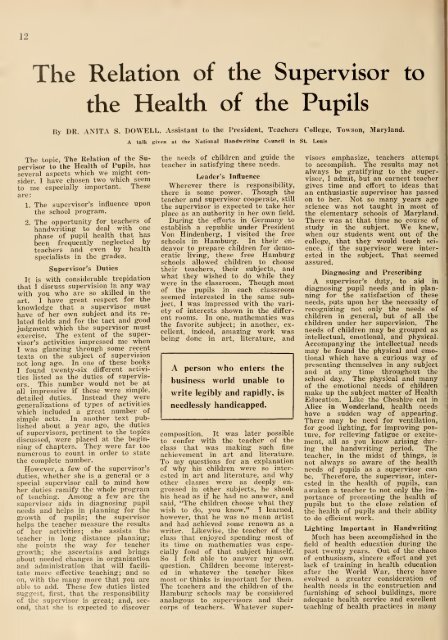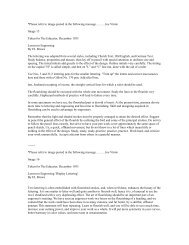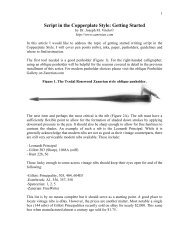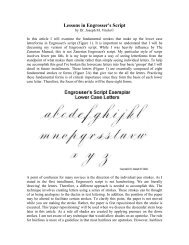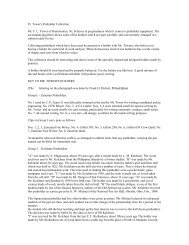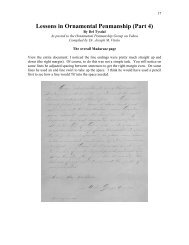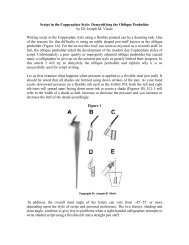The Educator (Volume 45) - IAMPETH
The Educator (Volume 45) - IAMPETH
The Educator (Volume 45) - IAMPETH
Create successful ePaper yourself
Turn your PDF publications into a flip-book with our unique Google optimized e-Paper software.
12<br />
<strong>The</strong> Relation of the Supervisor to<br />
the Health of the Pupils<br />
By DR. ANITA S. DOWELL, Assistant to the President, Teachers College, Towson, Maryland.<br />
A talk given at the National Handwriting Council in St. Louis<br />
<strong>The</strong> topic, <strong>The</strong> Relation of the Supervisor<br />
to the Health of Pupils, has<br />
several aspects which we might consider.<br />
I have chosen two which seem<br />
to me especially important. <strong>The</strong>se<br />
are:<br />
1. <strong>The</strong> supervisor's influence upon<br />
the school program.<br />
2. <strong>The</strong> opportunity for teachers of<br />
handwriting to deal with one<br />
phase of pupil health that has<br />
been frequently neglected by<br />
teachers and even by health<br />
specialists in the grades.<br />
Supervisor's Duties<br />
It is with considerable trepidation<br />
that I discuss supervision in any way<br />
with you who are so skilled in the<br />
art. I have great respect for the<br />
knowledge that a supervisor must<br />
have of her own subject and its related<br />
fields and for the tact and good<br />
judgment which the supei'visor must<br />
exercise. <strong>The</strong> extent of the supervisor's<br />
activities impressed me when<br />
I was glancing through some recent<br />
texts on the subject of supervision<br />
not long ago. In one of these books<br />
I found twenty-six different activities<br />
listed as the duties of supervisors.<br />
This number would not be at<br />
all impressive if these were simple,<br />
detailed duties. Instead they were<br />
generalizations of types of activities<br />
which included a great number of<br />
simple acts. In another text published<br />
about a year ago, the duties<br />
of supervisors, pertinent to the topics<br />
discussed, were placed at the beginning<br />
of chapters. <strong>The</strong>y were far too<br />
numerous to count in order to state<br />
the complete number.<br />
However, a few of the supervisor's<br />
duties, whether she is a general or a<br />
special supervisor call to mind how<br />
her duties ramify the whole program<br />
of teaching. Among a few are the<br />
supervisor aids in diagnosing pupil<br />
needs and helps in planning for the<br />
growth of pupils; the supervisor<br />
helps the teacher measure the results<br />
of her activities; she assists the<br />
teacher in long distance planning;<br />
she points the way for teacher<br />
growth; she ascertains and brings<br />
about needed changes in organization<br />
and administration that will facilitate<br />
more effective teaching; and so<br />
on, with the many more that you are<br />
able to add. <strong>The</strong>se few duties listed<br />
suggest, first, that the responsibility<br />
of the supervisor is great; and, second,<br />
that she is expected to discover<br />
the needs of children and guide the<br />
teacher in satisfying these needs.<br />
Leader's Influence<br />
Wherever there is responsibility,<br />
there is some power. Though tiie<br />
teacher and supei-visor cooperate, still<br />
the supervisor is expected to take her<br />
place as an authority in her own field.<br />
During the efforts in Germany to<br />
establish a republic under President<br />
Von Hindenberg, I visited the free<br />
schools in Hamburg. In their endeavor<br />
to prepare children for democratic<br />
living, these free Hamburg<br />
schools allowed children to choose<br />
their teachers, their subjects, and<br />
what they wished to do while they<br />
were in the classroom. Though most<br />
of the pupils in each classroom<br />
seemed interested in the same subject,<br />
I was impressed with the variety<br />
of interests shown in the different<br />
rooms. In one, mathematics was<br />
the favorite subject; in another, excellent,<br />
indeed, amazing work was<br />
being done in art, literature, and<br />
A person who enters the<br />
business world unable to<br />
write legibly and rapidly, is<br />
needlessly handicapped.<br />
composition. It was later possible<br />
to confer with the teacher of the<br />
class that was making such fine<br />
achievement in art and literature.<br />
To my questions for an explanation<br />
of why his children were so interested<br />
in art and literature, and why<br />
other classes were as deeply engrossed<br />
in other subjects, he shook<br />
his head as if he had no answer, and<br />
said, "<strong>The</strong> children choose what they<br />
wish to do, you know." I learned,<br />
however, that he was no mean artist<br />
and had achieved some renown as a<br />
writer. Likewise, the teacher of the<br />
class that enjoyed spending most of<br />
its time on mathematics was especially<br />
fond of that subject himself.<br />
So I felt able to answer my own<br />
question. Children become interested<br />
in whatever the teacher likes<br />
most or thinks is important for them.<br />
<strong>The</strong> teachers and the children of the<br />
Hamburg schools may be considered<br />
analagous to supervisors and their<br />
corps of teachers. Whatever super-<br />
visors emphasize, teachers attempt<br />
to accomplish. <strong>The</strong> results may not<br />
always be gratifying to the supervisor,<br />
I admit, but an earnest teacher<br />
gives time and effort to ideas that<br />
an enthusiastic supervisor has passed<br />
on to her. Not so many years ago<br />
science was not taught in most of<br />
the elementary schools of Maryland.<br />
<strong>The</strong>re was at that time no course of<br />
study in the subject. We knew,<br />
when our students went out of the<br />
college, that they would teach science,<br />
if the supervisor were interested<br />
in the subject. That seemed<br />
assured.<br />
Diagnosing and Prescribing<br />
A supervisor's duty, to aid in<br />
diagnosing pupil needs and in planning<br />
for the satisfaction of these<br />
needs, puts upon her the necessity of<br />
recognizing not only the needs of<br />
children in general, but of all the<br />
children under her supervision. <strong>The</strong><br />
needs of children may be grouped as<br />
intellectual, emotional, and physical.<br />
Accompanying the intellectual needs<br />
may be found the physical and emotional<br />
which have a curious way of<br />
presenting themselves in any subject<br />
and at any time throughout the<br />
school day. <strong>The</strong> physical and many<br />
of the emotional needs of children<br />
make up the subject matter of Health<br />
Education. Like the Cheshire cat in<br />
Alice in Wonderland, health needs<br />
have a sudden way of appearing.<br />
<strong>The</strong>re may be need for ventilation,<br />
for good lighting, for improving posture,<br />
for relieving fatigue or excitement,<br />
all as you know arising during<br />
the handwriting period. <strong>The</strong><br />
teacher, in the midst of things, is<br />
not always so aware of the health<br />
needs of pupils as a supervisor can<br />
be. <strong>The</strong>refore, the supervisor, interested<br />
in the health of pupils, can<br />
awaken a teacher to not only the importance<br />
of promoting the health of<br />
pupils but to the close relation of<br />
the health of pupils and their ability<br />
to do efficient work.<br />
Lighting Important in Handwriting<br />
Much has been accomplished in the<br />
field of health education during the<br />
past twenty years. Out of the chaos<br />
of enthusiasm, sincere effort and yet<br />
lack of training in health education<br />
after the World War, there have<br />
evolved a greater consideration of<br />
health needs in the construction and<br />
furnishing of school buildings, more<br />
adequate health service and excellent<br />
teaching of health practices in many


